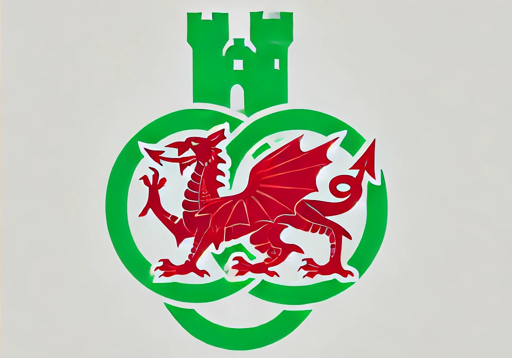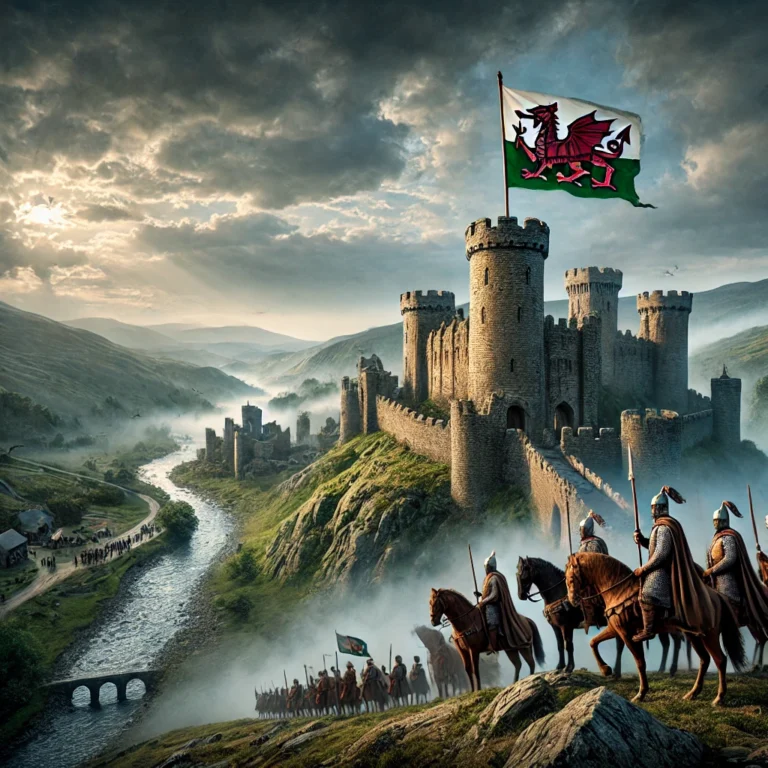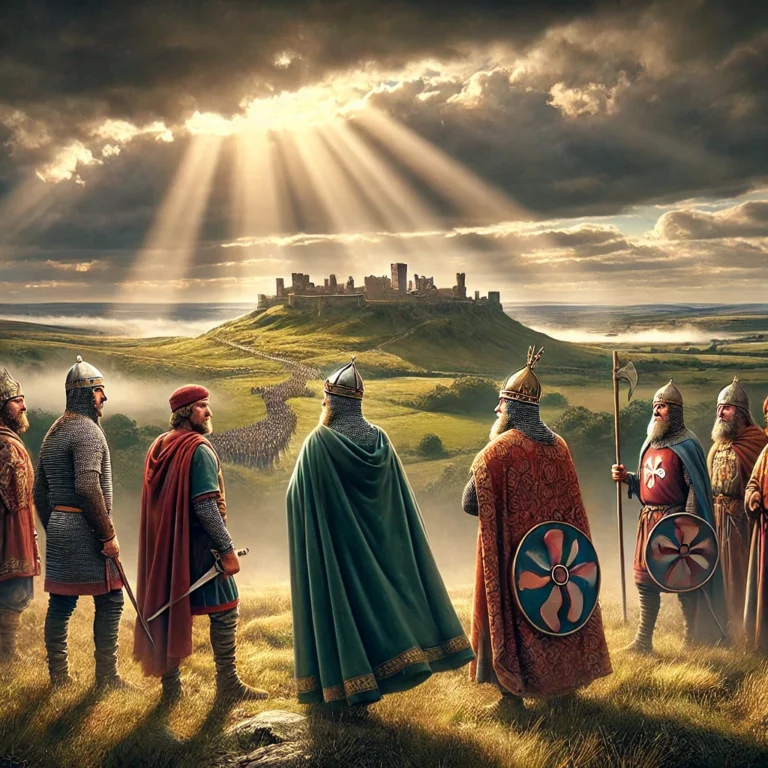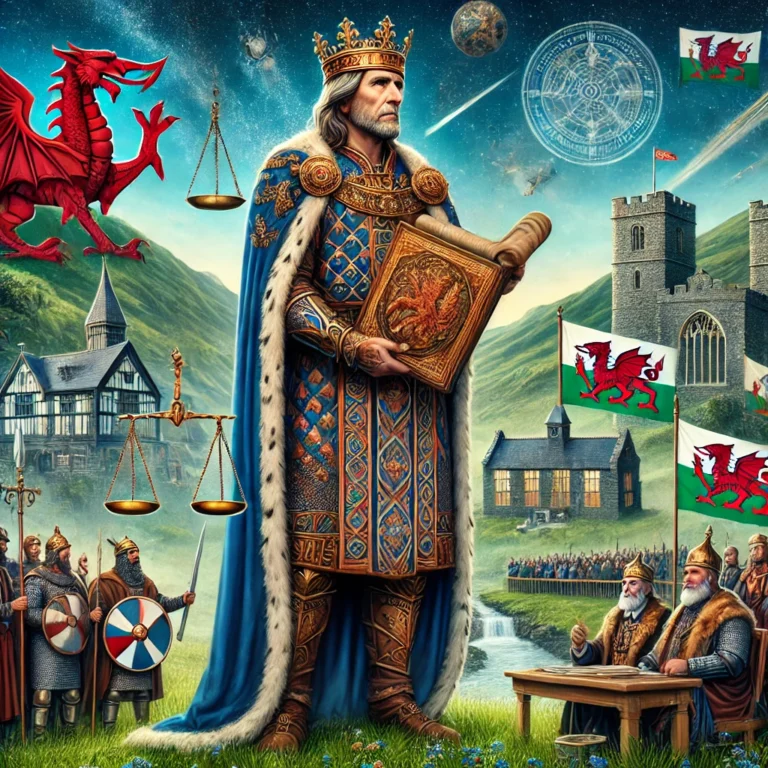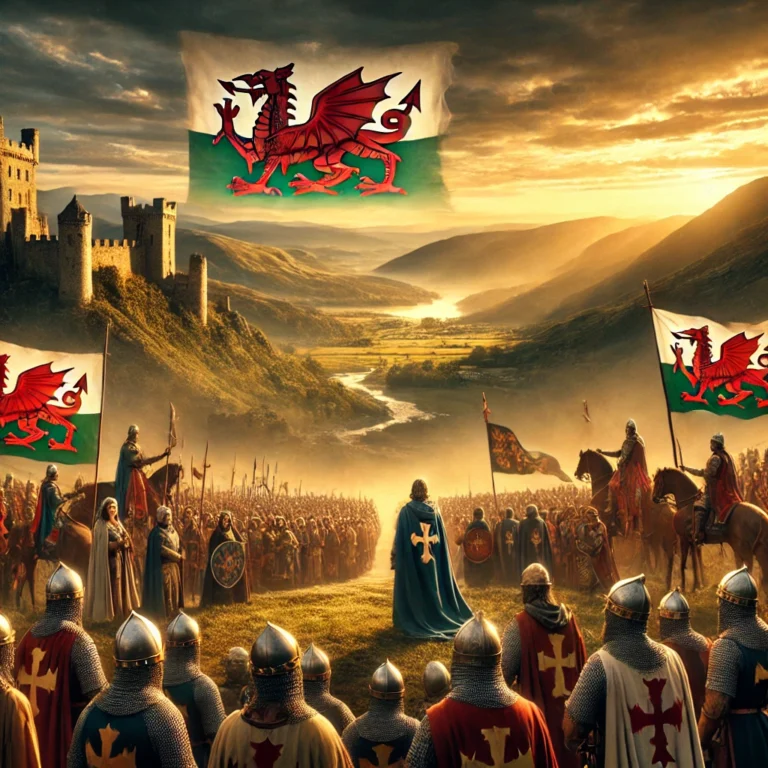Introduction: Rhodri Mawr Gwynedd – The Legacy of a Welsh Hero
Rhodri Mawr Gwynedd, often known as “Rhodri the Great,” holds a legendary status in Welsh history. As the ruler of Gwynedd and one of the earliest leaders to unite Welsh kingdoms under a single banner, he’s celebrated not only for his fierce defence against Viking invasions but also for his enduring impact on Welsh identity.
Born into a noble lineage, Rhodri Mawr rose to power at a time when Wales was fragmented into kingdoms and constantly under threat from external forces. His life, marked by remarkable resilience and unifying strategies, cemented his reputation as a foundational figure in medieval Welsh history.
Rhodri Mawr’s legacy is one of resistance and resilience, a symbol of Welsh strength against powerful adversaries. This article delves into the life and achievements of Rhodri Mawr, exploring his rise to power, his strategic defence against the Vikings, and his influence on Welsh politics and culture.
Early Life and Background of Rhodri Mawr

Rhodri Mawr was born into the royal family of Gwynedd, one of the most powerful kingdoms in Wales during the 9th century. His lineage connected him to earlier Welsh rulers who had established a legacy of resistance against Anglo-Saxon and other external forces. Growing up in a politically unstable environment, Rhodri witnessed firsthand the challenges facing Welsh territories, where power often shifted due to internal rivalries and external threats.
As he matured, Rhodri’s ambitions extended beyond his birthright in Gwynedd. He sought not just to rule his inherited lands but to unify Wales, seeing strength in collective Welsh identity. As mentioned above, Wales was separated and the ancient Powys and Dyfed may have we’ll been separate countries.
His early experiences shaped him into a leader who valued both resilience and strategy, qualities that would later define his rule.
Rhodri’s Lineage and Royal Bloodline
Rhodri Mawr’s lineage was crucial to his claim to power in Gwynedd and his influence over other Welsh kingdoms. As a descendant of Merfyn Frych, he was part of a dynasty that valued resistance and resilience.”
— Dr. John Davies, Welsh historian and author of “A History of Wales”
Rhodri Mawr’s royal lineage linked him to notable Welsh dynasties, granting him a legitimate claim to leadership in Gwynedd and influencing his ambitions beyond his own kingdom.
Rhodri was a descendant of Merfyn Frych, an earlier ruler of Gwynedd, whose reign laid the groundwork for resistance against external threats. This connection to Merfyn Frych not only bolstered Rhodri’s legitimacy but also provided him with a strong foundation for claiming leadership over other Welsh territories.
The royal bloodline of Gwynedd was highly respected across Wales, making Rhodri’s claim to power a natural evolution within Welsh politics. As he rose to prominence, his lineage played a role in garnering support among the people, who saw him as a continuation of their proud heritage and a leader capable of defending Welsh sovereignty.
Political Climate in Gwynedd during Rhodri’s Youth
The 9th century in Gwynedd was marked by frequent conflicts with neighbouring Welsh kingdoms and the Anglo-Saxons, creating a volatile environment that influenced Rhodri’s approach to leadership.
— University of Wales, “Medieval Welsh Dynasties and Political Rivalries”
The political landscape in Gwynedd during Rhodri’s youth was turbulent. Welsh kingdoms were frequently involved in skirmishes with neighbouring territories and faced constant threats from the Anglo-Saxons to the east and the growing Viking presence. This climate of conflict influenced Rhodri’s development, as he grew up in an environment where defence and resilience were essential.
The fragmented nature of Welsh politics, with multiple small kingdoms each vying for power, presented challenges in creating a unified front against external invaders.
Rhodri recognised early on that unity was essential for survival. His observations during these formative years instilled in him the belief that a united Wales could withstand the powerful forces threatening its borders. This understanding would later shape his efforts to bring Welsh kingdoms together under his leadership.
Rhodri Mawr’s Rise to Power in Gwynedd
Rhodri’s rise in North Wales was more than a territorial expansion; it was a calculated effort to bring stability to the region, unifying Welsh territories to strengthen defences against external threats.”
— Professor Janet Nelson, expert in medieval Welsh history
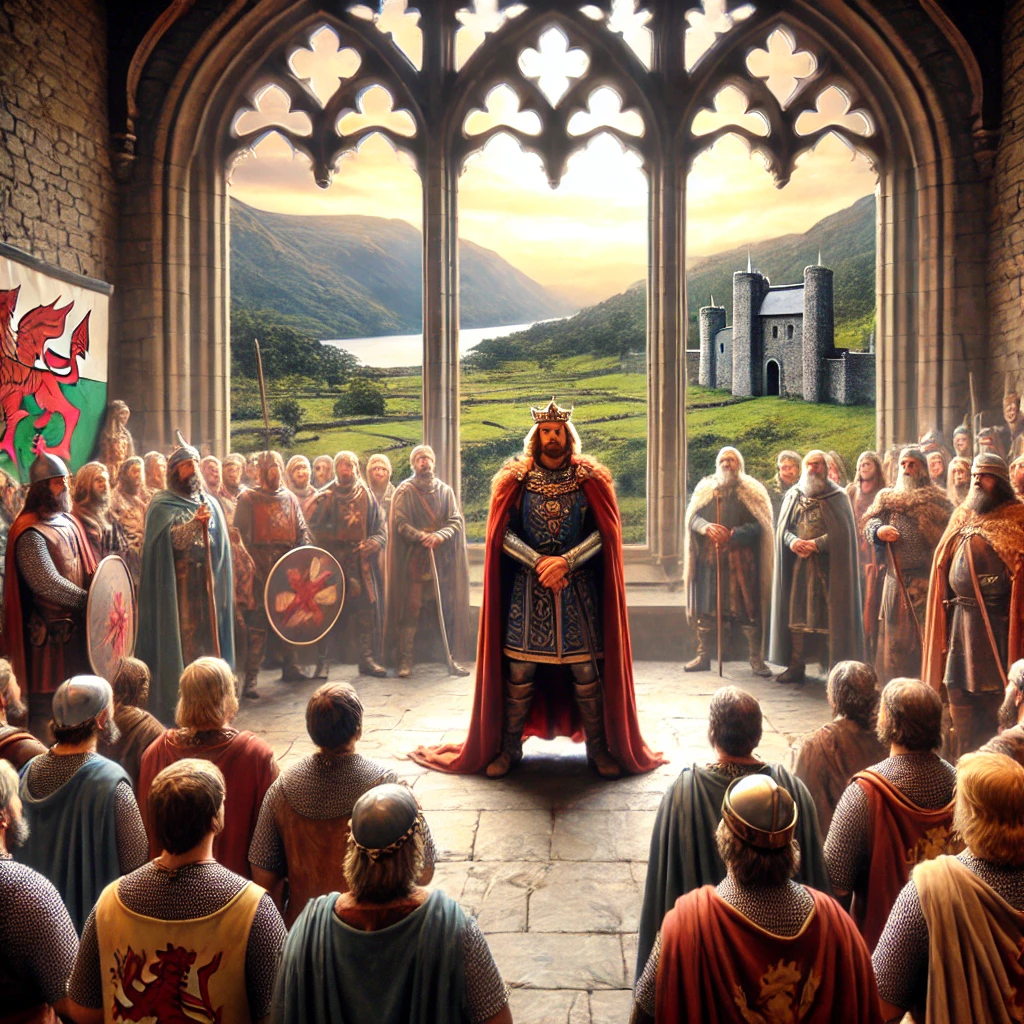
Rhodri’s rise to power was marked by both military skill and strategic alliances. Following the death of his father, Merfyn Frych, Rhodri inherited the throne of Gwynedd, assuming responsibility for defending his territory against Anglo-Saxon and Viking threats. However, Rhodri’s ambitions extended beyond merely maintaining control over Gwynedd; he sought to unify the scattered Welsh kingdoms under his rule.
Through a combination of alliances, military conquests, and his reputation as a defender of Wales, Rhodri expanded his influence, becoming the first Welsh leader to control multiple regions. This consolidation of power was not just about territorial gain; it was a calculated effort to create a united Welsh identity, capable of resisting both Viking invaders and the pressures from neighbouring Anglo-Saxon rulers.
Consolidation of Power and Control over North Wales
Rhodri’s first priority was consolidating power over North Wales, a region frequently targeted by external enemies. His efforts to bring surrounding areas under his rule were strategic; by controlling North Wales, he created a buffer zone that could help protect Gwynedd from invasions. Through a series of battles and negotiations, Rhodri extended his reach, gaining control over Powys and Seisyllwg in the south.
This expansion made Rhodri one of the most powerful leaders in Welsh history, allowing him to unify regions that had traditionally been governed independently.
His consolidation of North Wales represented a significant shift in Welsh politics, as it marked the beginning of a more unified and coordinated approach to defence and governance. Rhodri’s rule over North Wales laid the foundation for his later campaigns and his efforts to protect Wales as a whole.
Unifying Welsh Territories through Strategic Alliances
Records indicate that Rhodri forged alliances with neighbouring Welsh rulers, promoting a shared Welsh identity and fostering collaboration to resist Viking and Anglo-Saxon threats.
— Welsh History Review, “Alliances and Unity in Medieval Wales”
In addition to military strength, Rhodri recognised the importance of alliances in achieving his vision for a united Wales. He forged partnerships with other Welsh rulers, promoting a collective identity that transcended regional boundaries. This approach was revolutionary, as Welsh leaders had historically prioritised their own territories, often engaging in conflicts with neighbouring kingdoms.
By focusing on common goals and shared interests, Rhodri succeeded in fostering a sense of Welsh unity. His alliances helped strengthen his position, enabling him to call upon additional forces when defending against Viking raids or Anglo-Saxon incursions. Rhodri’s strategic alliances set a precedent for future Welsh leaders, demonstrating the value of unity in the face of powerful external threats.
Rhodri Mawr’s Defence Against Viking Invasions
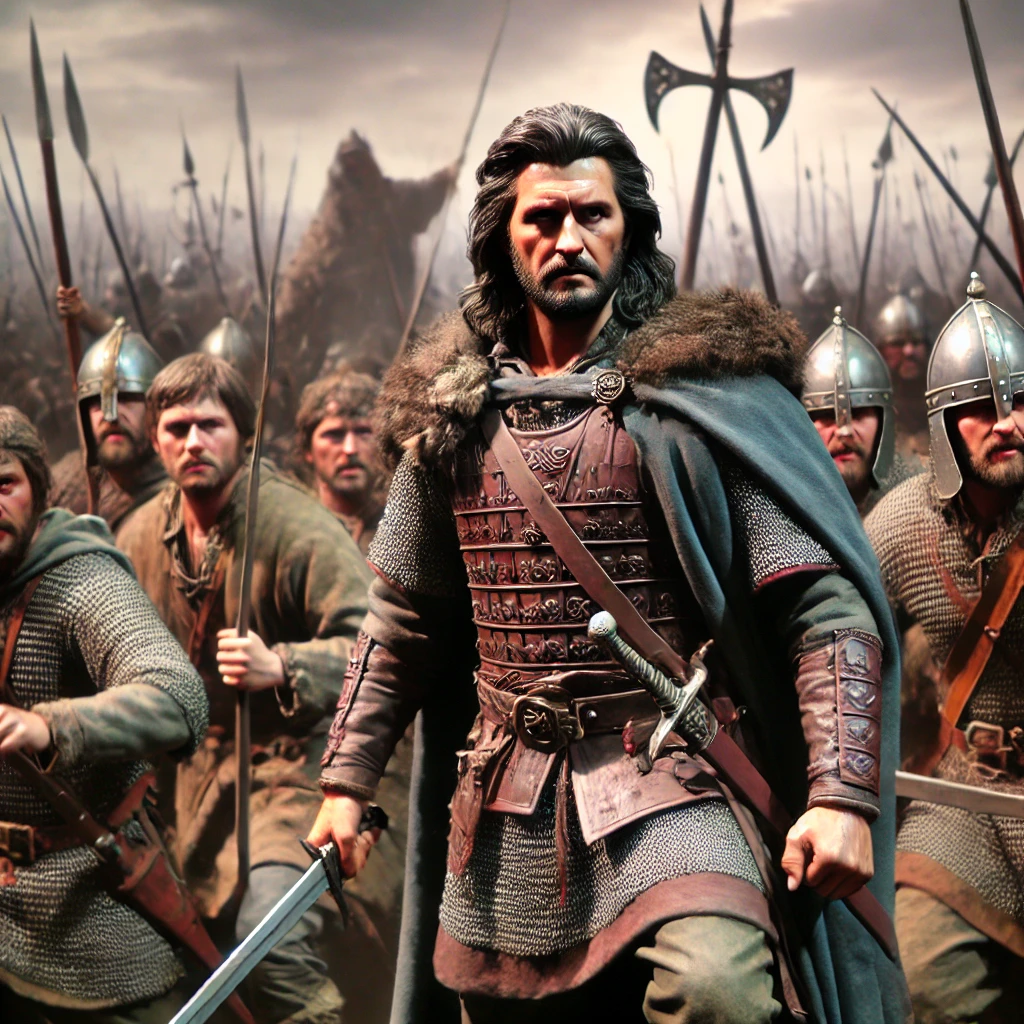
One of Rhodri’s most celebrated achievements was his role in defending Wales against Viking invasions. The Vikings, known for their brutal raids across the British Isles, had begun targeting Welsh territories, exploiting the fractured political landscape. Rhodri’s leadership during this period of turmoil showcased his tactical brilliance and his commitment to protecting his people.
Rhodri’s resistance against the Vikings was not merely defensive; he actively engaged the Norse invaders in battle, achieving several notable victories that strengthened his reputation as a warrior-king. His efforts to defend Wales against Viking incursions solidified his status as a legendary figure in Welsh history, embodying the resilience and strength of the Welsh people.
Key Battles Against Viking Forces
In 856 AD, Rhodri achieved a notable victory against Viking forces, repelling a major raid and securing Gwynedd’s borders, which was a significant morale boost for the Welsh people.
— Cambridge University Press, “Viking Invasions and Welsh Resistance”
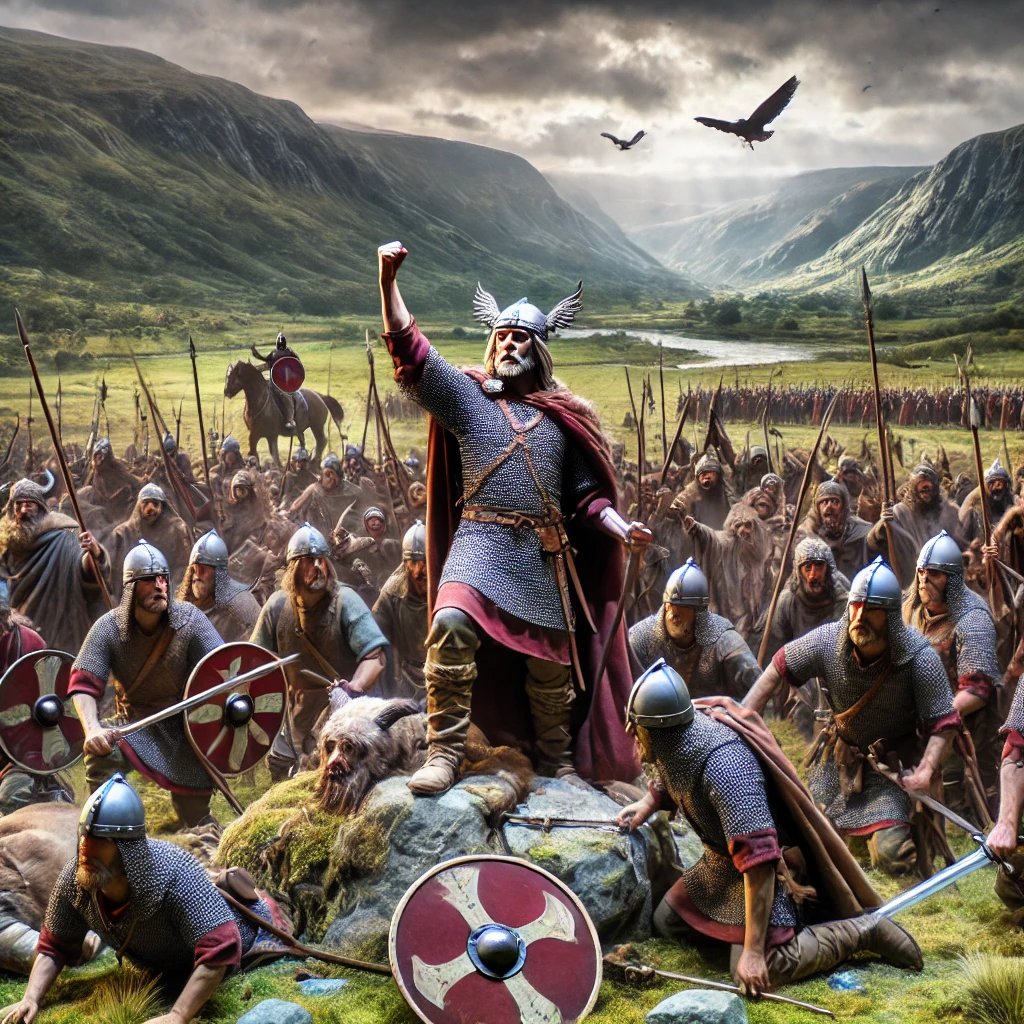
Rhodri’s encounters with Viking forces included some of the most pivotal battles in Welsh history. In 856 AD, he achieved a decisive victory against the Vikings, repelling their advances and securing Gwynedd’s borders. This battle became emblematic of his military prowess and his dedication to protecting his homeland from foreign invaders.
Rhodri’s success in these key battles elevated his status, both within Wales and beyond. His victories against the Vikings were not just military achievements; they were symbolic of his commitment to Welsh sovereignty and his vision for a unified, independent Wales. These battles left an enduring mark on Welsh history, solidifying Rhodri’s reputation as one of the greatest defenders of the land.
Rhodri’s defence strategies against Viking incursions not only protected Gwynedd but also inspired other Welsh leaders to adopt a more unified approach to national defence. Rhodri understood that the Viking threat extended beyond Gwynedd, and he actively encouraged cooperation among Welsh territories. His leadership created a coordinated resistance that frustrated Viking ambitions in Wales and established him as a symbol of Welsh resilience.
The Vikings found Wales to be an especially challenging target due to Rhodri’s well-planned defences and his alliances with neighbouring kingdoms. Rhodri’s approach demonstrated that a unified response was crucial for survival, a lesson that resonated across Wales long after his reign.
Defensive Tactics and Guerrilla Warfare
Rhodri Mawr’s ability to repel Viking raids with guerrilla tactics and defensive positioning demonstrated his deep understanding of both the Viking threat and the Welsh terrain.”
— Dr. Clare Downham, Viking Age historian
Rhodri Mawr’s success against the Vikings was partly due to his innovative defensive tactics. Rather than relying solely on open battle, Rhodri adopted guerrilla warfare strategies, using the Welsh landscape to his advantage. The rugged terrain of Gwynedd, with its mountains and valleys, provided ideal conditions for hit-and-run tactics, which allowed Rhodri’s forces to strike at the Vikings before retreating to safety.
Rhodri’s ability to adapt to Viking tactics was key to his defensive success. By leveraging his knowledge of the land, he made it difficult for the Vikings to establish a foothold in Wales. His approach to guerrilla warfare would become a defining characteristic of Welsh resistance, influencing future leaders and reinforcing Wales’s reputation as a fiercely independent nation.
Rhodri Mawr’s Influence on Welsh Politics and Society
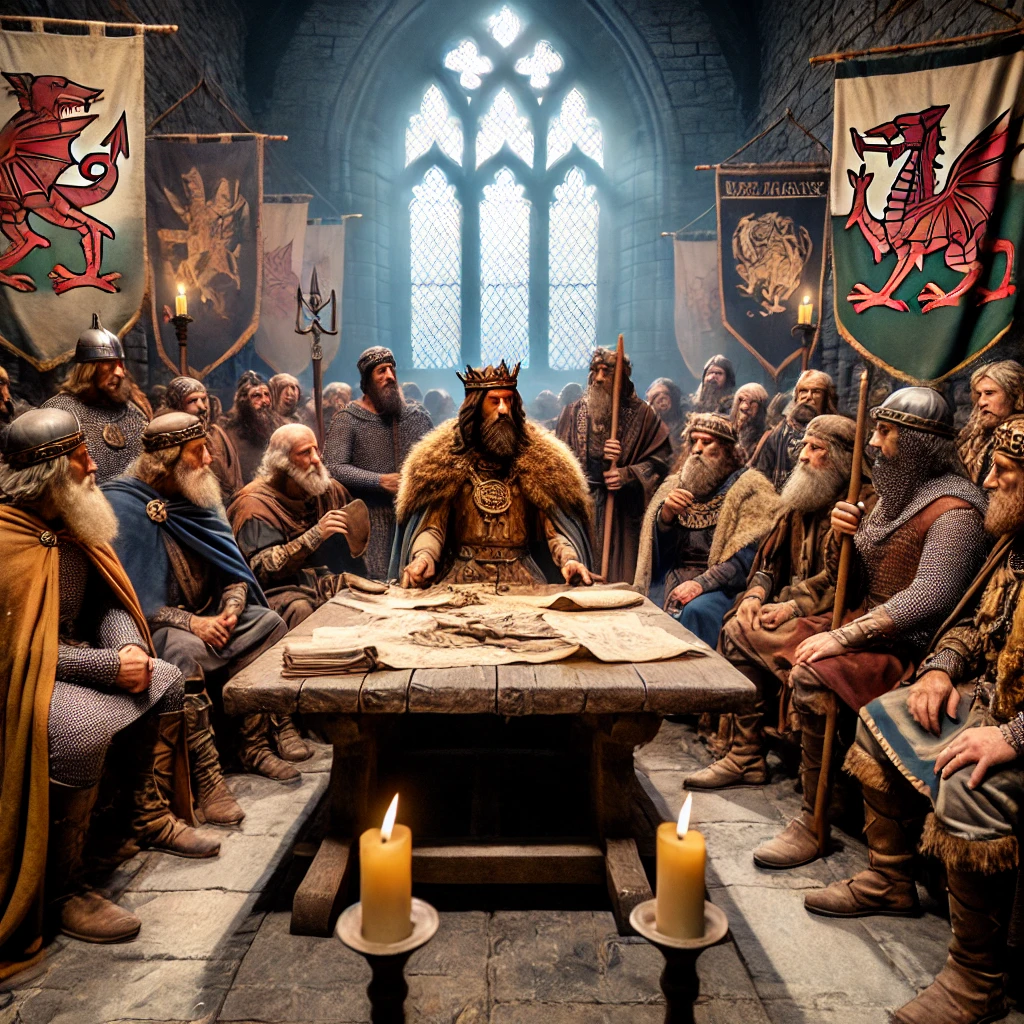
Rhodri Mawr’s impact extended beyond the battlefield. As a visionary leader, he introduced several reforms aimed at stabilising Welsh society and strengthening its governance. His contributions to Welsh politics and society laid the groundwork for a more unified and resilient nation, capable of facing external threats and preserving its identity.
Rhodri’s leadership style and reforms marked a shift in Welsh governance, bringing a degree of centralisation and structure that had previously been lacking. His influence can be seen in the legal and social changes he encouraged, which helped establish a sense of continuity and order within Welsh society.
Legal and Social Reforms Under Rhodri’s Rule
Rhodri’s emphasis on governance and justice laid the groundwork for later Welsh laws, which were eventually codified by Hywel Dda. Rhodri’s rule brought a degree of structure and unity to Welsh society.”
— Professor Sara Elin Roberts, author of “The Laws of Hywel Dda”
One of Rhodri’s most enduring contributions was his focus on establishing consistent legal standards across the regions under his rule. Although he did not create formal written laws, Rhodri promoted a unified system of justice, encouraging fair treatment and consistency within the territories he controlled. His approach laid the foundations for later Welsh leaders, including Hywel Dda, who would go on to codify Welsh laws.
Rhodri’s emphasis on justice and fairness helped foster stability within Welsh society, which had often been fragmented by regional disputes. His leadership contributed to a culture of respect for Welsh customs and traditions, strengthening the social fabric and promoting a sense of unity. This focus on governance as well as warfare highlighted Rhodri’s vision of a prosperous and stable Wales, not just a land defended by force.
Strengthening Welsh Identity and Unity
Historical texts and genealogical records show that Rhodri’s unification efforts helped cultivate a shared Welsh identity, which became a symbol of resistance against both Vikings and Anglo-Saxons.
— National Museum of Wales, “Welsh Identity and Unification in the 9th Century”
By uniting Welsh territories and defending against foreign invaders, Rhodri Mawr helped to shape a collective Welsh identity. His leadership created a shared sense of purpose among the Welsh, who saw in Rhodri a defender of their lands, culture, and autonomy. This unity would be essential in the years following his reign, as Wales continued to face threats from the Vikings and the Anglo-Saxons.
Rhodri’s efforts to bring Welsh kingdoms together left a lasting impact, creating a foundation for a national identity that transcended regional loyalties. His legacy as a unifier and protector contributed to a sense of pride and independence that endures in Welsh culture to this day. Rhodri Mawr’s influence on Welsh unity became a symbol of the strength that could be achieved through collaboration and resilience.
The Legacy of Rhodri Mawr Gwynedd
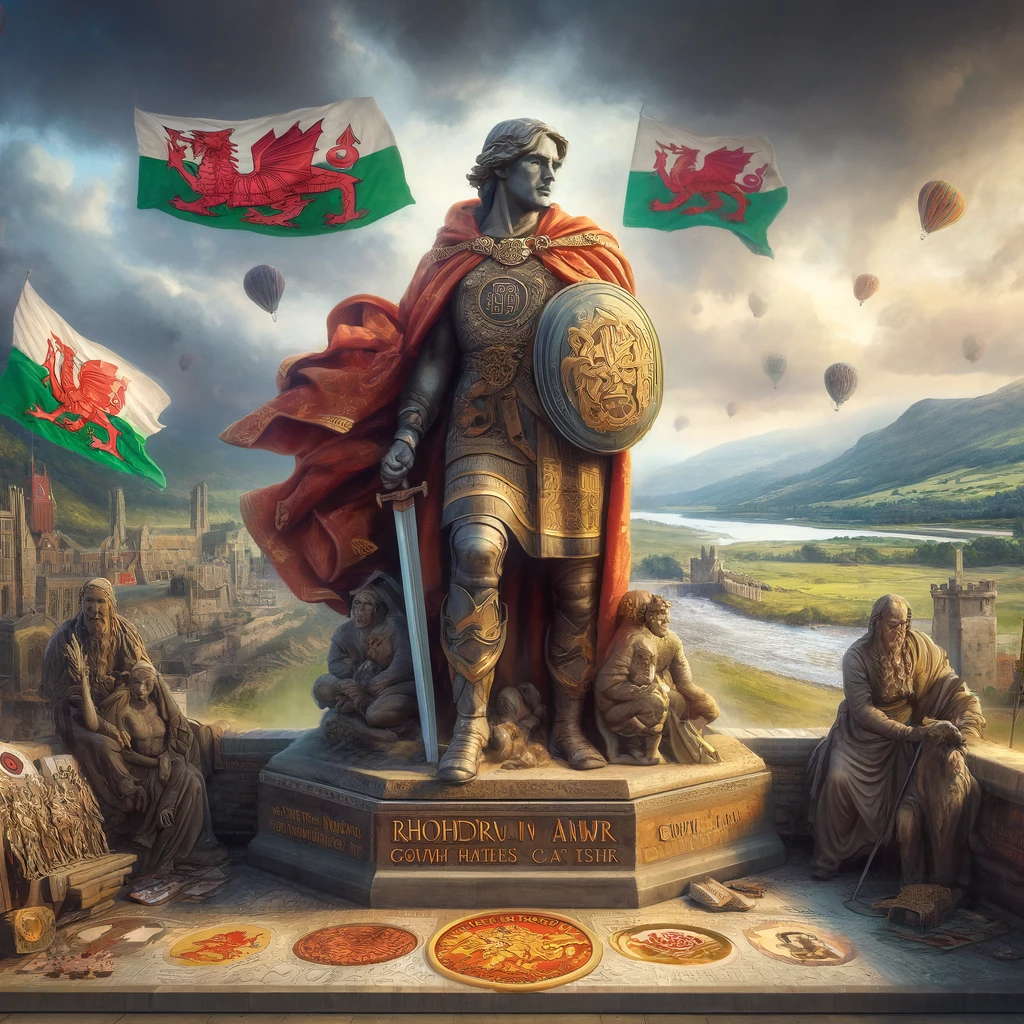
The legacy of Rhodri Mawr Gwynedd extends far beyond his lifetime. As a unifier, warrior, and statesman, he is remembered as a foundational figure in Welsh history. His achievements set the stage for future leaders, who would draw inspiration from his vision of a united and resilient Wales.
Rhodri’s reputation as “Rhodri the Great” reflects his influence not only in Gwynedd but across all of Wales, where his memory has been preserved through stories, traditions, and historical accounts.
Rhodri’s legacy is visible in the continued efforts of Welsh leaders to defend their land and promote unity, even in the face of overwhelming odds. His life and achievements have become part of the Welsh national consciousness, symbolising the enduring spirit of a people determined to maintain their autonomy and culture.
Rhodri Mawr in Welsh Folklore and Legends
“Rhodri Mawr’s legacy endures in Welsh folklore and cultural memory as a hero who united the Welsh people against powerful foes, becoming a symbol of resilience and unity.”
— Dr. Huw Pryce, professor of Welsh history
Rhodri’s exploits and victories against the Vikings have been celebrated in Welsh folklore, where he is often portrayed as a larger-than-life figure who protected his people from foreign invaders. Stories about Rhodri’s bravery and strategic prowess have been passed down through generations, reinforcing his status as a national hero.
In Welsh legends, Rhodri Mawr is depicted as a symbol of resistance and resilience. These tales highlight his strength, wisdom, and dedication to his people, making him an enduring figure in Welsh cultural memory. Rhodri’s legacy in folklore serves as a reminder of the importance of unity and strength in the face of adversity, values that remain central to Welsh identity.
Rhodri’s Influence on Subsequent Welsh Rulers
Rhodri’s example as a unifier and defender of Wales influenced future rulers, including Hywel Dda and Llywelyn the Great, who emulated his leadership in their own efforts to protect and govern Wales.
— Welsh Historical Society, “The Legacy of Rhodri Mawr on Welsh Monarchy”
Rhodri Mawr’s influence on Welsh leadership continued long after his death. His vision for a united Wales inspired later rulers, who sought to build upon his legacy of unity and resistance. Leaders like Hywel Dda, who codified Welsh law, and Llywelyn the Great, who continued Rhodri’s struggle for independence, can trace elements of their leadership to Rhodri’s example.
Rhodri’s success in defending Wales and promoting unity set a precedent for future leaders, who recognised the strength that could be achieved through collaboration and strategic alliances. His legacy provided a framework for resistance and resilience, guiding Welsh leaders in their efforts to preserve Welsh culture and autonomy. Rhodri Mawr’s contributions helped shape the trajectory of Welsh history, ensuring that his influence would be felt for generations.
Key Takeaways
- Rhodri Mawr Gwynedd: His life and legacy established him as one of Wales’s most important historical figures, known for uniting Welsh territories and defending against Viking invasions.
- Strategic Defence and Resilience: Rhodri’s use of guerrilla tactics and alliances showcased his military genius, making him a formidable opponent to the Vikings and a unifying force in Wales.
- Cultural and Political Influence: Beyond warfare, Rhodri’s reforms in governance and law laid the groundwork for a more centralised and unified Welsh society.
- Enduring Legacy: Rhodri Mawr’s impact on Welsh identity, culture, and folklore continues to resonate, symbolising strength, unity, and resilience in Welsh history.
Conclusion: Rhodri Mawr Gwynedd – A Pillar of Welsh History
Rhodri Mawr Gwynedd’s life and achievements left an indelible mark on Wales. As a unifier, warrior, and visionary, he transformed Welsh society and set the foundations for a unified Wales capable of defending itself against powerful adversaries. His resistance against the Vikings and his contributions to Welsh unity established him as a hero, and his legacy lives on in the collective memory of the Welsh people.
Today, Rhodri Mawr is celebrated as a symbol of resilience and pride, an enduring reminder of Wales’s capacity to stand strong in the face of threats. His story is not just a historical account; it is a source of inspiration, illustrating the strength that can be achieved through unity and leadership. Rhodri Mawr Gwynedd’s legacy remains a cornerstone of Welsh heritage, a testament to the enduring spirit of a nation that values its independence and cultural identity.
Matt
